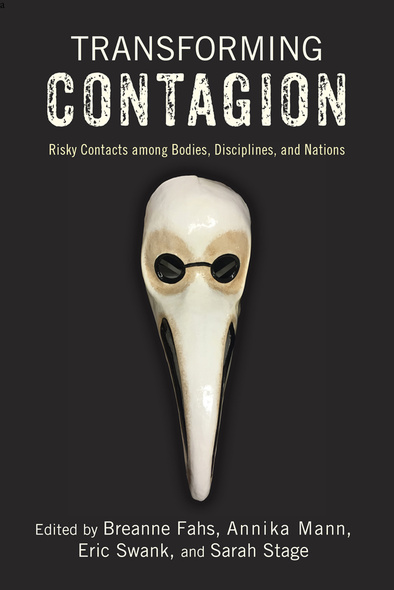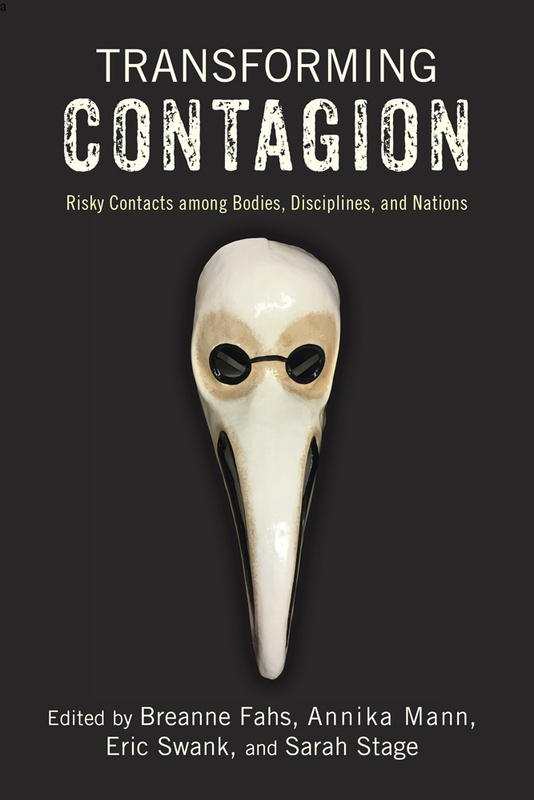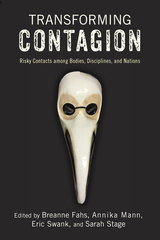Transforming Contagion
Risky Contacts among Bodies, Disciplines, and Nations
Rutgers University Press
2019 Choice Outstanding Academic Title
Moving from viruses, vaccines, and copycat murder to gay panics, xenophobia, and psychopaths, Transforming Contagion energetically fuses critical humanities and social science perspectives into a boundary-smashing interdisciplinary collection on contagion. The contributors provocatively suggest contagion to be as full of possibilities for revolution and resistance as it is for the descent into madness, malice, and extensive state control. The infectious practices rooted in politics, film, psychological exchanges, social movements, the classroom, and the circulation of a literary text or meme on social media compellingly reveal patterns that emerge in those attempts to re-route, quarantine, define, or even exacerbate various contagions.
Moving from viruses, vaccines, and copycat murder to gay panics, xenophobia, and psychopaths, Transforming Contagion energetically fuses critical humanities and social science perspectives into a boundary-smashing interdisciplinary collection on contagion. The contributors provocatively suggest contagion to be as full of possibilities for revolution and resistance as it is for the descent into madness, malice, and extensive state control. The infectious practices rooted in politics, film, psychological exchanges, social movements, the classroom, and the circulation of a literary text or meme on social media compellingly reveal patterns that emerge in those attempts to re-route, quarantine, define, or even exacerbate various contagions.
This is an extraordinary book that radically rethinks and expands our understanding of contagion. Crossing historical, geographical and disciplinary boundaries, Transforming Contagion brings a feminist, queer and new materialist perspective that insists on the possibilities as well as the risks and anxieties of contagion.’
Traversing the humanities and social sciences, the essays in Transforming Contagion offer a fertile prism for exploring how contagion--the spread of beliefs, emotions, texts, practices, people, and pathogens across communities and culture--has been represented, experienced, addressed, and theorized across disciplines and historical periods. This volume establishes contagion as a central keyword for studying not only biomedical but also cultural, psychological, and political forms of connection, communication, and collective action.’
Chronicle of Higher Education 'New Scholarly Books' Weekly Book List, August 31, 2018,' compiled by Nina C. Ayoub
This edited collection of essays examines the forms, meanings, and processes of contagion across modes and sites of transmission, historical periods, and methods of scholarly analysis. This broadly referenced text is an excellent example of scholarship in the critical humanities and social science disciplines. Highly recommended.
BREANNE FAHS is a professor of women and gender studies at Arizona State University. She is the author of several books, including Out for Blood: Essays on Menstruation and Resistance.
ANNIKA MANN is an assistant professor of English at Arizona State University.She is the author of Reading Contagion: The Hazards of Reading in the Age of Print.
ERIC SWANK is an associate professor of social and cultural analysis at Arizona State University.
SARAH STAGE is a professor of women and gender studies at Arizona State University. She is the author or co-editor of numerous books, including Female Complaints: Lydia Pinkham and the Business of Women's Medicine.
ANNIKA MANN is an assistant professor of English at Arizona State University.She is the author of Reading Contagion: The Hazards of Reading in the Age of Print.
ERIC SWANK is an associate professor of social and cultural analysis at Arizona State University.
SARAH STAGE is a professor of women and gender studies at Arizona State University. She is the author or co-editor of numerous books, including Female Complaints: Lydia Pinkham and the Business of Women's Medicine.
Contents
Introduction: Contagion as Unruly Subject
Breanne Fahs, Annika Mann, Eric Swank, and Sarah Stage
Part I – Quarantine/Exposure
Part II – Flesh/Spirit
Part III – Madness/Reason
Part IV – Revolution/Bureaucracy
Index
Acknowledgments
About the Contributors
Introduction: Contagion as Unruly Subject
Breanne Fahs, Annika Mann, Eric Swank, and Sarah Stage
Part I – Quarantine/Exposure
- “A Proper Contagion”: The Inoculation Narrative and the Immunological Turn
- Before the Cell, There Was Virus: Rethinking the Concept of Parasite and Contagion Through Contemporary Research in Evolutionary Virology
- Social (Ir)Responsibility: Vaccine Exemption and the Ethics of Immunity
- “Radiophobia” and the Politics of Social Contagion
Part II – Flesh/Spirit
- Isn’t Contagion Just a Metaphor?Reading Contagion in Daniel Defoe’s Journal of the Plague Year
- Contagious Accumulation and Racial Capitalism in Late Nineteenth Century American Fiction
- Performance and the Contagious Swirl of Dramatic Tradition: Performative Revision and Subversion
Part III – Madness/Reason
- Viral Murder: Contagious Killings and Epidemic Beliefs
- Am I a Psychopath?
- Cult of the Penis: Male Fragility and Phallic Frenzy
Part IV – Revolution/Bureaucracy
- Fear of the Diseased Immigrant: Contagion, Xenophobia, and Belonging
- Prophylactic Policing and the Epidemiology of Dissent in the Soviet-Era Baltic States
- Sexual Politics and Contagious Social Movements
- Words on Fire: Radical Pedagogies of the Feminist Manifesto
Index
Acknowledgments
About the Contributors






